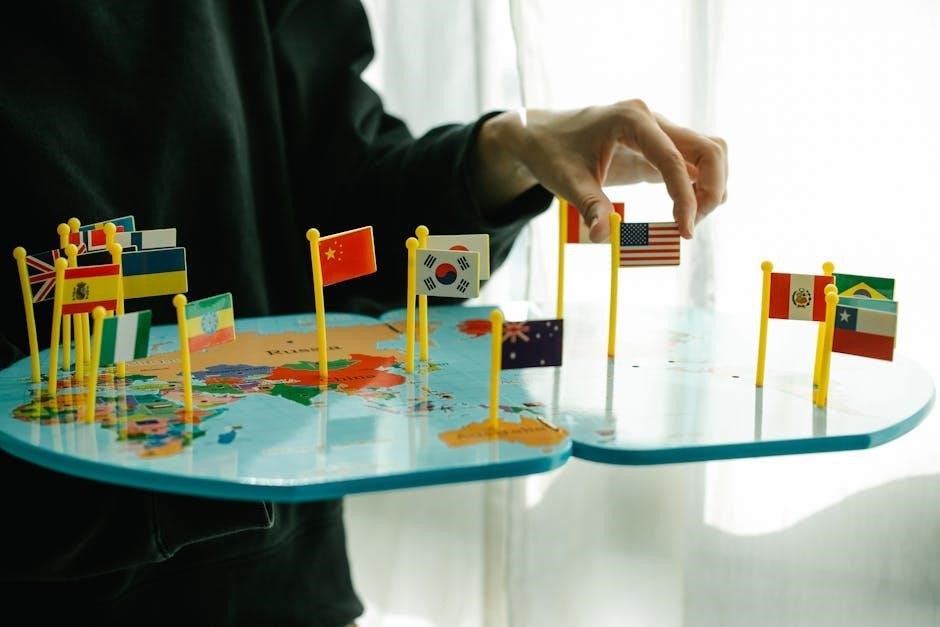Utopia is a fictional paradise, envisioned as an ideal society, where perfection reigns. It is a medieval land divided into 40 islands, each containing 8 kingdoms. Every kingdom comprises up to 25 provinces, with players ruling one province, engaging in diplomacy, warfare, and development. This world of vast oceans and hidden secrets offers exploration, puzzles, and strategic growth, blending adventure with philosophical ideals of a perfect society.
1.1 Definition and Concept of Utopia
Utopia, a term coined by Thomas More in 1516, represents an idealized society where perfection reigns. Derived from Greek, it combines “ou” (no) and “eu” (good), suggesting a “no place” that is also a “good place.” This concept embodies a visionary society free from conflicts, inequality, and suffering, often serving as a critique of existing social structures. In the context of the guide, Utopia is portrayed as a medieval world divided into 40 islands, each housing 8 kingdoms. These kingdoms consist of provinces, with players governing one, engaging in diplomacy, warfare, and development. Utopia blends philosophical ideals of harmony with strategic gameplay, offering a unique blend of exploration, puzzles, and growth, all while maintaining its essence as a perfect, albeit unattainable, society.
1.2 Historical Background of Utopia
Utopia, a concept introduced by Sir Thomas More in 1516, is rooted in his critique of societal flaws. The term, derived from Greek, signifies a “no place” that is also a “good place,” envisioning a perfect society without money or private property. Historically, Utopia reflects More’s ideal of equality and justice, contrasting with the inequalities of his era. This vision has influenced countless literary and philosophical works, shaping the idea of a flawless world. In the guide, Utopia is depicted as a medieval realm of 40 islands, each with 8 kingdoms and up to 25 provinces, offering a blend of exploration, strategy, and philosophical ideals, embodying More’s timeless vision of a perfect society.
1.3 Relevance of Utopia in Modern Society
Utopia remains a timeless concept, inspiring modern society to strive for perfection. Its ideals of equality and justice resonate in today’s political and social movements. The vision of a society without private property challenges contemporary capitalism, sparking debates on economic systems. Utopia also influences sustainability efforts, offering a blueprint for harmonious coexistence with nature. In literature and media, it serves as a reflection of human aspirations for a better world. Utopia’s relevance lies in its ability to critique current societal flaws and inspire innovation, making it a enduring theme in both philosophy and popular culture, guiding humanity toward progress and idealistic goals.

The World of Utopia
Utopia is a medieval realm comprising 40 islands, each divided into 8 kingdoms with up to 25 provinces, fostering governance, diplomacy, and collective progress.
2.1 Overview of the Utopian Islands
The Utopian Islands are a central element of the world, comprising 40 distinct landmasses. Each island is divided into 8 kingdoms, with up to 25 provinces per kingdom. Players govern one province, contributing to the kingdom’s prosperity through diplomacy, warfare, and resource management. The islands are designed to foster exploration and strategic growth, with diverse geography and climates influencing gameplay. Provinces collaborate or compete, shaping the kingdom’s overall success. This interconnected system creates a dynamic environment where every decision impacts the broader Utopian landscape.
2.2 Structure of Kingdoms and Provinces
Each Utopian kingdom is a cohesive unit comprising multiple provinces, with the number varying between 1 and 25. Provinces within a kingdom collaborate to achieve shared goals, such as resource production, military strength, and territorial expansion. The structure fosters both cooperation and competition among provinces, as their collective efforts determine the kingdom’s overall success; Players, as rulers of their province, must strategically manage resources, buildings, and diplomacy to contribute effectively to their kingdom. This hierarchical system allows for specialized roles and coordinated strategies, ensuring that each province’s unique strengths benefit the entire kingdom. The interplay between provinces and kingdoms creates a dynamic, interconnected political and economic landscape in Utopia.
2.3 Geography and Climate of Utopia
Utopia is an archipelago of 40 islands, each hosting 8 kingdoms, creating a diverse geographical landscape. The islands vary in size and climate, ranging from lush, fertile lands ideal for agriculture to rocky coastlines perfect for trade and defense. Players must adapt to their province’s unique geography, leveraging natural resources like forests, mines, and coastal access. The climate influences resource production, with temperate zones fostering balanced growth and harsher climates challenging rulers to optimize their economy. Strategic positioning on an island can offer advantages in trade, warfare, and exploration, making geography a critical factor in shaping a province’s success and a kingdom’s dominance.

Gameplay Mechanics
Utopia’s gameplay revolves around resource management, building, and military strategy. Players oversee province development, balance economies, and engage in warfare, fostering growth and prosperity through strategic decisions and alliances.
3.1 Resource Management in Utopia
Resource management is crucial in Utopia, where players oversee the production and allocation of essential resources within their province. These resources are vital for building, military, and economic growth. By optimizing production, players can ensure a steady supply of goods, supporting both their province and kingdom. Trade with other provinces and kingdoms further enhances resource management, allowing for the exchange of surplus goods. Effective resource management ensures sustainability, enabling players to maintain prosperity and prepare for challenges. Proper allocation and optimization are key to achieving long-term success in Utopia’s dynamic world.
3.2 Building and Construction
Building and construction are central to the growth and development of your province in Utopia. Players can construct various types of buildings, such as residential, commercial, military, and industrial structures, to enhance their province’s capabilities. These buildings support resource production, military strength, and the overall prosperity of your province. Construction requires careful planning and resource allocation to ensure buildings are optimized for their intended purposes. As your province expands, the need for strategic construction increases, allowing you to support your kingdom and contribute to its success. Effective building strategies are essential for balancing economic, military, and social needs, ensuring long-term growth and stability in Utopia.
3.3 Military and Warfare Strategies
Military and warfare strategies are crucial for defending your province and expanding your influence in Utopia. Players must balance offensive and defensive tactics, utilizing soldiers, weapons, and fortifications to protect their province and conquer others. Military strength relies on resource allocation, with buildings like barracks and armories playing key roles. Strategic alliances with neighboring provinces can enhance your military capabilities, while careful planning ensures resource efficiency. Warfare in Utopia demands adaptability, as enemies may employ unique tactics. Researching technologies and upgrading military units can provide a competitive edge. Effective warfare strategies not only safeguard your province but also contribute to your kingdom’s dominance, making military prowess a cornerstone of success in Utopia.

Diplomacy and Alliances
Diplomacy and alliances are vital for cooperation and mutual benefit in Utopia. Forming alliances strengthens kingdoms, enabling collective defense and resource sharing. Negotiations and trade agreements foster prosperity, while resolving conflicts ensures harmony and stability, aligning with utopian ideals of cooperation and shared success.
4.1 Forming Alliances with Other Provinces
Forming alliances with other provinces is a cornerstone of success in Utopia. By uniting with neighboring provinces, you can share resources, coordinate military efforts, and strengthen your collective defense. Alliances foster cooperation and mutual benefit, allowing provinces to thrive together. Effective communication and trust are essential for maintaining strong alliances. Provinces within the same kingdom often collaborate to achieve common goals, while inter-kingdom alliances can expand influence and secure trade routes; Alliances also provide strategic advantages, such as shared intelligence and coordinated attacks, enabling provinces to grow and prosper in a competitive world. Building and nurturing these relationships is vital for long-term success in Utopia.
4.2 Negotiation and Trade
Negotiation and trade are essential elements in Utopia, fostering cooperation and economic prosperity. Provinces can engage in trade to exchange resources, strengthening their economies and relationships. Diplomatic negotiations allow leaders to forge mutually beneficial agreements, ensuring stability and growth. Trade agreements can enhance resource production, while strategic negotiations prevent conflicts. Effective communication and compromise are key to successful trade deals. By mastering negotiation and trade, provinces can secure valuable alliances, optimize resource distribution, and thrive in a competitive world. These interactions not only bolster individual provinces but also contribute to the overall prosperity of kingdoms and islands in Utopia.
4.3 Conflict Resolution
Conflict resolution in Utopia is crucial for maintaining harmony among provinces and kingdoms. Disputes often arise over resources or territorial claims, requiring diplomatic or military solutions. Mediation by neutral parties or alliances can prevent escalation, while arbitration may resolve issues through mutually accepted terms. Warfare remains a last resort, emphasizing the importance of strategic planning and resource management. Effective conflict resolution strengthens alliances, ensures stability, and fosters long-term prosperity. Leaders must balance negotiation with military preparedness to protect their province’s interests while maintaining peace. This delicate balance is key to thriving in Utopia’s dynamic and competitive world.

Strategic Growth and Development
Strategic growth in Utopia involves expanding your province’s influence, optimizing resource production, and advancing technologically. Balance diplomacy, warfare, and development to secure a prosperous and powerful future.
5.1 Expanding Your Province
Expanding your province in Utopia requires strategic planning and resource management. Begin by optimizing your province’s infrastructure, ensuring efficient production of essential resources like food, wood, and iron. Construct buildings that support growth, such as farms, sawmills, and mines, to sustain your population and military. Explore neighboring lands to uncover hidden resources and opportunities for expansion. Engage in diplomacy or warfare to acquire additional territories, strengthening your kingdom’s influence. Balance expansion with defense, as overextending can leave your province vulnerable. Use technological advancements to enhance productivity and military might, ensuring sustainable growth. By carefully managing resources and strategically expanding, you can build a thriving and powerful province in Utopia.
5.2 Optimizing Resource Production
Optimizing resource production is crucial for the prosperity of your province in Utopia. Focus on understanding the balance between food, wood, and iron production, as each resource plays a vital role in sustaining your population, constructing buildings, and fueling your military. Upgrade your farms, sawmills, and iron mines to increase output, and ensure your workforce is allocated efficiently. Trade with neighboring provinces to supplement shortages or exchange surplus resources. Regularly monitor your resource levels to avoid overproduction, which can strain your province’s economy. Invest in technological advancements to enhance productivity and reduce waste. By streamlining resource production, you can maintain stability, support growth, and build a robust foundation for your province’s success in Utopia.
5.3 Technological Advancements
Technological advancements play a pivotal role in shaping the progress of your province in Utopia. By investing in research and development, you can unlock new technologies that enhance resource production, military capabilities, and infrastructure. These innovations allow for more efficient tools, improved building designs, and advanced weaponry. For instance, upgrading your agricultural techniques can boost food production, while advancements in metallurgy can strengthen your military equipment. Additionally, technological progress can lead to discoveries that solve puzzles and uncover hidden secrets within the game. Balancing technological growth with resource management ensures sustainable development, enabling your province to thrive in both peaceful and competitive environments. Embrace innovation to stay ahead in the ever-evolving world of Utopia.

Exploration and Adventure
Utopia is a mysterious world filled with hidden secrets, puzzles, and riddles waiting to be uncovered. Explore vast islands, discover new locations, and solve challenges to progress.
6.1 Discovering Hidden Secrets
Utopia is a land filled with hidden secrets, puzzles, and mysterious locations waiting to be uncovered. Players can explore vast islands, discovering hidden caves, ruins, and other undisclosed areas. Each province and kingdom holds its own mysteries, such as forgotten blueprints, ancient notes, and cryptic messages. Solving these puzzles often reveals rewards or unlocks new paths. The journey through Utopia is not just about ruling a province but also about uncovering its lore and history. Exploration is a key aspect of the game, encouraging players to venture beyond their province and into the unknown. The ultimate challenge lies in discovering the final boss and overcoming it, which crowned the adventure in Utopia.
6.2 Solving Puzzles and Riddles
Utopia is filled with intricate puzzles and riddles that challenge players to think creatively. From deciphering ancient texts to unlocking hidden mechanisms, these puzzles are integral to progressing through the game. Many puzzles are tied to the lore of the islands, requiring players to explore and gather clues. Solving these challenges often rewards players with valuable resources, blueprints, or access to previously inaccessible areas. Riddles, in particular, test players’ knowledge of Utopian history and mythology, adding depth to the gameplay experience. Each solved puzzle brings a sense of accomplishment and furthers the player’s understanding of the world. Puzzles also often connect to the larger narrative, making them a key part of the adventure in Utopia.
6.3 The Final Boss Fight
The final boss fight in Utopia is a climactic challenge that tests players’ skills, strategy, and preparation. This formidable opponent is a mastermind of chaos, requiring players to utilize all the knowledge and resources gathered throughout their journey. To succeed, players must carefully study the boss’s patterns, exploit weaknesses, and employ advanced tactics. Victory is not just about strength but also about wit and teamwork. Defeating the final boss unlocks exclusive rewards and completes the main storyline, offering a sense of ultimate achievement. This epic confrontation is a defining moment in Utopia, pushing players to their limits and rewarding their dedication with a thrilling conclusion.
The Concept of Utopia
Utopia represents the ideal of a perfect society, envisioned by Thomas More in 1516, where equality and justice reign without money or private property, sparking philosophical debates on its feasibility.
7.1 Philosophical Interpretations of Utopia
Utopia, a term coined by Thomas More in 1516, combines the Greek words “ou” (no) and “eu” (good), creating a paradoxical concept of a perfect society. Philosophers interpret Utopia as a blueprint for an ideal world, where equality, justice, and prosperity reign. It challenges conventional societal structures, advocating for the abolition of private property and money, as seen in More’s vision of a moneyless, egalitarian society. Critics argue that Utopia’s perfection is unattainable, often leading to authoritarianism. Despite this, Utopian ideals inspire movements toward social improvement, reflecting humanity’s enduring pursuit of a better world. This philosophical dichotomy makes Utopia a timeless subject of debate, balancing hope and critique in its exploration of societal perfection.
7.2 Utopia as a Perfect Society
Utopia embodies the vision of a perfect society, where equality, justice, and prosperity prevail. In Thomas More’s original concept, Utopia is an island nation free from greed, with no private property or money, fostering a truly egalitarian society. Every citizen contributes to the common good, ensuring resources are managed efficiently and everyone’s needs are met. This idealized world promotes peace, harmony, and collective well-being, offering a stark contrast to the inequalities of real-world societies. The absence of greed and corruption allows Utopians to thrive in a system where fairness and cooperation reign supreme, creating a blueprint for humanity’s potential to achieve true societal perfection.
7.3 Criticisms of Utopian Ideals
Utopian ideals have faced criticism for their perceived impracticality and potential dangers. Critics argue that the pursuit of a “perfect” society often overlooks human nature’s complexity and diversity. The suppression of individuality and creativity in favor of collective harmony is a common concern. Additionally, utopian models often rely on authoritarian structures to maintain order, which can lead to oppression. The idea of a society without conflict or inequality is seen as unrealistic, as it disregards the inherent competitiveness and self-interest of humans. Furthermore, utopian ideals can inspire radical societal experiments, which have historically led to unintended consequences, such as totalitarian regimes. This critique highlights the tension between the ideal of perfection and the realities of human imperfection.
Utopia blends idealism with strategic gameplay, offering a world of diplomacy, exploration, and growth. Its timeless appeal lies in the pursuit of perfection, balancing challenge and inspiration.
8.1 Summary of Key Points
Utopia is a medieval world divided into 40 islands, each containing 8 kingdoms with up to 25 provinces. Players rule a province, engaging in diplomacy, warfare, and development. The game blends strategy, exploration, and philosophical ideals of a perfect society. It offers a mix of resource management, building, and military tactics, with opportunities for alliances and trade. Exploration reveals secrets, puzzles, and challenges, culminating in a final boss fight. Utopia’s concept, rooted in Thomas More’s 1516 vision, represents an ideal society without greed or inequality. While criticized for its impracticality, Utopia inspires growth and reflection, balancing challenge and inspiration in its pursuit of perfection.
8.2 The Future of Utopia
Utopia’s future lies in its adaptability and the timeless appeal of its concept. As a medieval-inspired world, it continues to evolve, blending historical ideals with modern gameplay mechanics. The integration of new technologies and player-driven innovations will shape its direction. Expanding islands, kingdoms, and provinces could introduce fresh challenges and opportunities. Diplomacy and warfare strategies may become more complex, while exploration and puzzle-solving elements could deepen. Utopia’s philosophical roots ensure it remains a creative outlet for envisioning perfect societies. Its future is bright, with a growing community and endless possibilities for growth, ensuring it stays relevant in the ever-changing world of gaming and beyond.
8.3 Final Thoughts on Utopia
Utopia, as a concept and a game, offers a timeless blend of adventure, strategy, and philosophical reflection. Its intricate world, divided into islands, kingdoms, and provinces, provides endless opportunities for exploration and growth. Players can shape their provinces, engage in diplomacy, and master warfare, all while uncovering hidden secrets and solving puzzles. Utopia’s appeal lies in its adaptability, allowing players to envision and create their ideal society. Whether focusing on resource management, technological advancements, or alliances, the game fosters creativity and critical thinking. As a guiding principle, Utopia reminds us that perfection is a journey, not a destination, inspiring us to strive for better worlds, both virtual and real.
